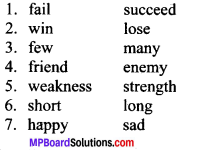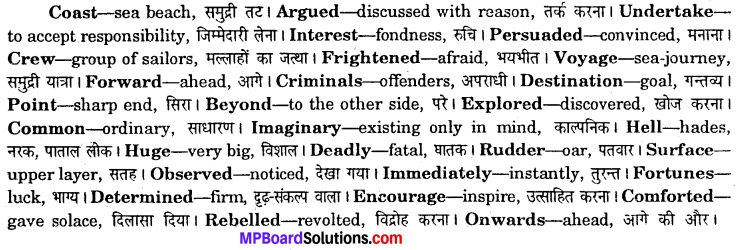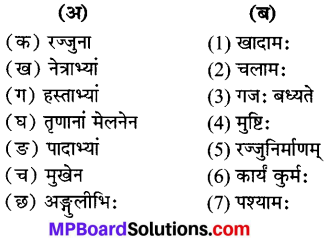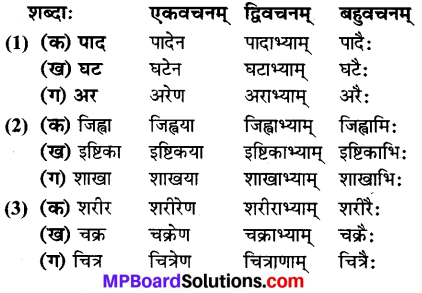MP Board Class 6th Hindi Sugam Bharti Solutions Chapter 1 मैं ढूँढ़ता तुझे था
MP Board Class 6th Hindi Sugam Bharti Chapter 1 प्रश्न-अभ्यास
वस्तुनिष्ठ प्रश्न
मैं ढूंढता तुझे था कविता का अर्थ MP Board Class 6th प्रश्न 1.
(क) सही जोड़ी बनाइए
1. दीन के – (क) विरक्त
2. कर्म में – (ख) वतन
3. अधीर – (ग) मगन
4. जग से – (घ) मन
उत्तर
1. (ख), 2. (ग), 3. (घ), 4. (क)
Mp Board Solution Class 6 Hindi प्रश्न (ख)
दिए गए शब्दों में से उपयुक्त शब्द छांटकर रिक्त स्थानों की पूर्ति कीजिए
1. मैं…..तुझे था अब कुंज और वन में। (खोजता/ढूंढ़ता)
2. आँखें……..मेरी तब मान और धन में। (लगी थी/खुली थी)
3. हे दीनबंधु! ऐसी…….प्रदान कर तू। (प्रतिमा प्रतिभा)
4. ऐसा प्रभा भर दे मेरे……..मन में। (अशांत/अधीर)
उत्तर
1. ढूँढ़ता
2. लगीं थी
3. प्रतिभा
4. अधीर
MP Board Class 6th Hindi Sugam Bharti Chapter 1 अतिलघु उत्तरीय प्रश्न
Mp Board Class 6 Hindi Chapter 1 प्रश्न 2.
निम्नलिखित प्रश्नों के उत्तर एक-एक वाक्य में दीजिए
(क) कवि ने ईश्वर को दीनबंधु क्यों कहा है?
उत्तर
कवि ने ईश्वर को दीनबंधु इसलिए कहा है क्योंकि ईश्वर दीन-दुखियों की सेवा में लगा रहता है।
(ख) अधीर मन की अधीरता किस प्रकार दूर हो सकती है?
उत्तर
अधीर मन की अधीरता तब दूर हो सकती है जब कवि ईश्वर को पा लेगा।
(ग) ‘जग की अनित्यता’ का क्या अर्थ है?
उत्तर
इसका अर्थ है-संसार की क्षणभंगुरता।
(घ) कवि किस स्थिति में हार नहीं मानता?
उत्तर
कवि दुख में हार नहीं मानता।
(ङ) “किरन’, ‘सुमन’, ‘पवन’, और ‘गगन’ किसके स्वरूप हैं?
उत्तर
ये सभी ईश्वर के स्वरूप हैं।
(च) कविता में ‘मैं’ और ‘तू’ शब्दों का प्रयोग किसके लिए किया गया है?
उत्तर
‘मैं’ का प्रयोग कवि के लिए और ‘तू’ का प्रयोग ईश्वर के लिए किया गया है।
MP Board Class 6th Hindi Sugam Bharti Chapter 1 लघुत्तरीय प्रश्न
Sugam Bharti Class 6 MP Board प्रश्न 3.
निम्नलिखित प्रश्नों के उत्तर तीन से पाँच वाक्यों में दीजिए
(क) केवल संगीत और भजन में ईश्वर को न ढूँढकर और कहाँ-कहाँ ढूँढना चाहिए?
उत्तर
ईश्वर को संगीत और भजन के माध्यम से पाना मुश्किल है। अगर ईश्वर को सही मायने में पाना
तो दीन-दुखियों के बीच जाना पड़ेगा, उनकी सेवा करनी पड़ेगी ईश्वर दीन-दुखियों में निवास करता है।
(ख) “कर्म में मगन और कवन में व्यस्त” इस पंक्ति “भाव स्पष्ट कीजिए।
उत्तर
ईश्वर परोपकार के काम में लगा था जबकि कवि केवल व्यर्थ बोलने में लगा हुआ था। ईश्वर हमेशा बिना किसी के दबाव के अपना काम करता जाता है। मनुष्य झूठी दुनियादारी में खोया रहता है। मनुष्य के कथनी और करनी में हमेशा अंतर रहता है जबकि ईश्वर कुछ कहता नहीं है, सिर्फ सत्कर्म में लगा रहता है।
(ग) कवि और ईश्वर की उपस्थिति के पाँच-पाँच स्थान बताइए।
उत्तर
कवि-बगीचा, जंगल, मंदिर, चमन, भजन
ईश्वर-दीन-दुखियों के बीच, किरण में, फूलों में, पवन में, आकाश में।।
(घ) ‘मान और धन की अपेक्षा ईश्वर दीन-दुखियों के आँसू में निवास करता है।’ समझाइए।
उत्तर
मानव संसार की चकाचौंध में खोया रहता है। उसे अपने मान-सम्मान और धन-दौलत की ज्यादा चिंता रहती है। इसके विपरीत ईश्वर दीन-दुखियों के आँसू | पोंछने में व्यस्त रहता है। वह गिरे हुए को उठाने में लगा रहता है।
(ङ) ‘दुख में न हार मानूं सुख में तुझे न भूलूं’ पंक्ति में निहित भाव बताइए।
उत्तर
कवि ईश्वर से प्रार्थना करता है कि वह उसमें इतनी क्षमता दे कि वह दुख में हार नहीं माने साथ ही सुख के क्षणों में उसे (ईश्वर को) भूले नहीं।
भाषा की बात
Mp Board Class 6 Hindi प्रश्न 4.
निम्नलिखित शब्दों का शुद्ध उच्चारण कीजिए
कुंज, संगीत, संगठन, विरक्त, समर्थ।
उत्तर
छात्र स्वयं करें।
Mp Board Class 6 Hindi Solution प्रश्न 5.
निम्नलिखित शब्दों की शुद्ध वर्तनी लिखिएदुआर, उतथान, आँख, स्वरग, कठनाई, सूयश, सोन्दर्य
उत्तर
द्वार, उत्थान, आँख, स्वर्ग, कठिनाई, सुयश, सौन्दर्य।
Mp Board Solution Class 6th Hindi प्रश्न 6.
निम्नलिखित शब्दों का वाक्यों में प्रयोग कीजिए
बाट, आँसू, पतित, संगठन, अनित्यता।
उत्तर
बाट-माँ कब से बेटे की बाट देख रही है।
आँसू-हमें किसी भी हाल में आँसू नहीं बहाना चाहिए।
पतित-ईश्वर पतितों का उद्धार करता है।
संगठन-हमें किसी संगठन की तरह काम करना चाहिए।
अनित्यता-हमें इस संसार की अनित्यता में खो नहीं जाना चाहिए।
सुगम भारती कक्षा 6 MP Board प्रश्न 7.
निम्नलिखित के विलोम शब्द लिखएि
स्वर्ग, धीर, नित्य, हार, सुख।
उत्तर
नरक, अधीर, अनित्य, जीत, दुःख।
Mp Board Class 6th Hindi प्रश्न 8.
निम्नलिखित वाक्यों को बहुवचन में बदलिए
(क) महिला भजन गा रही है।
(ख) दुखी की सहायता करो।
(ग) तुम अपनी कठिनाई बताओ।
(घ) अपनी पुस्तक को संभालकर रखना चाहिए।
(ड) चिड़िया आकाश में उड़ रही है।
उत्तर
(क) महिलाएँ भजन गा रही हैं।
(ख) दुखियों की सहायता करो।
(ग) तुम अपनी कठिनाईयाँ बताओ।
(घ) अपनी पुस्तकों को संभालकर रखना चाहिए।
(ङ) चिड़िया आकाश में उड़ रही है।
Mp Board Class 6th Hindi Solution प्रश्न 9.
निम्नलिखित शब्दों के पर्यायवाची शब्द छांटकर लिखिए
(क) आंख – दृग, आग, नयन, हर्ष, लोचन।
(ख) आकाश – पानी, गगन, बिजली, नभ, अम्बर ।
(ग) हवा -वायु, सुधा, पवन, समीर, सखा।
(घ) फूल -चिड़िया, सुमन, बादल, प्रसून, पुष्प।
उत्तर
(क) आँख – दृग, नयन, लोचन।
(ख) आकाश – गगन, नभ, अम्बर।
(ग) हवा – वायु, पवन, समीर।
(घ) फूल – सुमन, प्रसून, पुष्प।
मैं ढूँढ़ता तुझे था प्रसंग सहित व्याख्या
1. मेरे लिए खड़ा था दुखियों के द्वार पर तू,
मैं बाट जोहता था तेरी किसी चमन में।
बनकर किसी के आँसू मेरे लिए बहा तू,
आँखें लगी थी मेरी मान और धन में।
बाजे बजा बजाकर मैं था तुझे रिझाता,
तब तू लगा हुआ था पतितों के संगठन में।
मैं था विरक्त जग से इसकी अनित्यता पर।
उत्थान भर रहा था तब तू किसी पतन में।
शब्दार्थ – बाट जोहना=प्रतीक्षा करना । चमन=बागबगीचा । मान=सम्मान । रिझाना=आकर्षित करना । पतित =गिरे हुए। विरल=उदासीन । जग=संसार । अनित्यता=अनियमित। उत्थान=उपर उठाना।
प्रसंग-प्रस्तुत पद्यांश हमारी पाठ्य-पुस्तक सुगम भारती-6 में संकलित कविता ‘मैं ढूंढ़ता तुझे था’ से लिया गया है। इसके कवि हैं-रामनरेश त्रिपाठी। इसमें उन्होंने ईश्वर की महिमा का गुणगान किया है।
व्याख्या-मानव ईश्वर को बाग-बगीचे में ढूंढ़ता है किन्तु वह तो दीन-दुखियों के द्वार पर खड़ा होता है। ईश्वर किसी की आह बनकर मानव को पुकारता है किंतु लोग अपनी दुनिया में मस्त रहते हैं। वे सोचते हैं कि संगीत और भजन गाने से ईश्वर खुश होगा और उसकी पुकार सुन लेगा लेकिन ऐसा होता नहीं है। क्योंकि ईश्वर तो गिरे हुए को उठाने में लगा होता है। लोग संसार से उदासीन होकर ईश्वर को खोजते हैं परंतु वह किसी के पतन को उत्थान में बदल रहा होता है।
विशेष
- ईश्वर की महिमा का गुणगान है।
- अनुप्रास अलंकार का प्रयोग किया गया है।
- कविता लयात्मक और संगीतात्मक है।
2. तू रूप है किरन में, सौंदर्य है सुमन में,
तू प्राण है पवन में, विस्तार है गगन में।
हे दीनबंधु! ऐसी प्रतिभा प्रदान कर तू,
देखू तुझे दृगो में, मन में तथा वचन में।
कठिनाईयों, दुखों का इतिहास ही सुयश है।
तुझको समर्थ कर तू बस कष्ट के सहन में।
दुख में न हार मानूं, सुख में तुझे न भूलूं,
ऐसा प्रभाव भर दे, मेरे अधीर मन में।
शब्दार्थ-किरन=रौशनी। सौंदर्य =सुंदरता। सुमन= फूल । गगन=आकाश । दीनबंधु=भगवान ।
सुयश=प्रसिद्धि। ‘अधीर=व्याकुल।
प्रसंग-पूर्ववत्
व्याख्या-कवि ईश्वर की महिमा का गुणगान करते हुए कहता है कि वह किरण में रूप है, पुष्प में सौंदर्य है। पवन में प्राण हैं और गगन में विस्तार है। कवि प्रार्थना करता है कि ईश्वर उसमें प्रतिभा प्रदान करें ताकि वह उसे (ईश्वर को) आँखों में, मन में, और वचन में देख सके। कठिनाईयों और दुःखों का इतिहास गौरवशाली होता है। कवि ईश्वर से प्रार्थना कर रहा है कि वह उसमें कष्ट सहने की क्षमता दे ताकि वह दुःख में हार नहीं माने और साथ ही सुख के क्षणों में ईश्वर को भूले नहीं।
विशेष
- ईश्वर की महिमा का गुणगान।
- अनुप्रास अलंकार का प्रयोग किया गया है।
- कविता लयात्मक और संगीतात्मक है।











